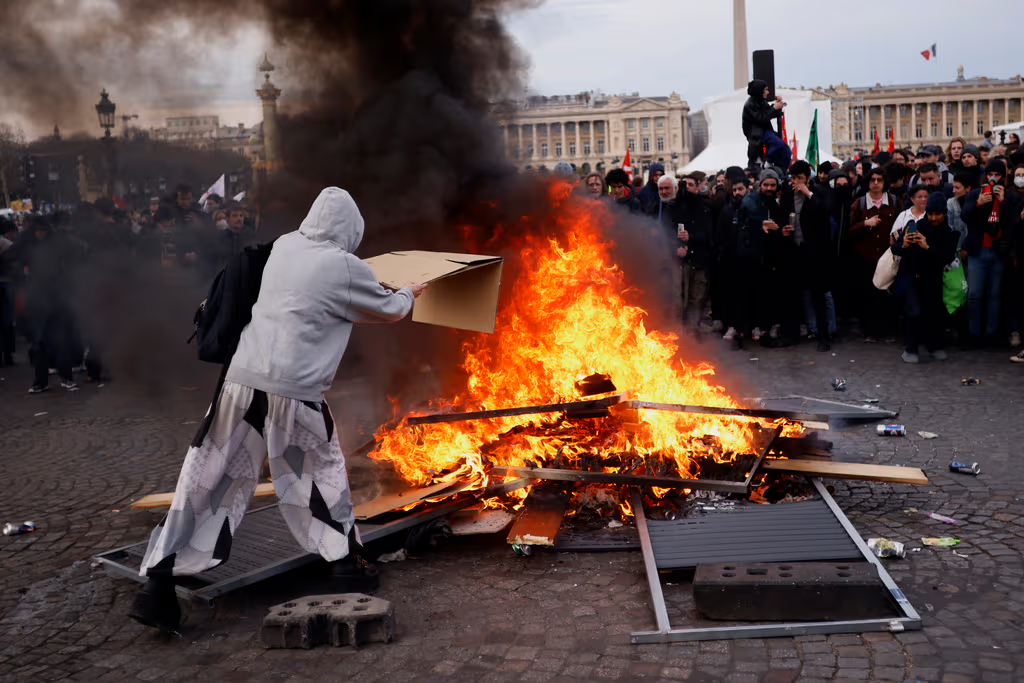Is Paris Burning?
Macron resorts to a constitutional catch to enact retirement system reform — but could he end up a lame canard?

Anti-government rioters setting fire to the garbage that has been piling up for days due to an anti-government strike by garbage collectors: this is how Paris looked Thursday, right after the prime minister, Elizabeth Borne, resorted to article 49.3 of the constitution to pass her Retirement Reform Bill at the National Assembly. It’s a striking image of the current French crisis.
Article 49.3 allows the prime minister, in case he has no majority at the Assembly on a specific proposal related to finance or welfare issues, or a limited number of other issues, to pass it without a vote. However, such a procedure allows in turn the opposition to call for a vote of no confidence. Should the prime minister lose it, the president of the Republic must appoint a new one.
While “49.3”— as it is routinely referred to — traces back to an old and accepted parliamentary practice, it has often been decried as one of the “authoritarian” elements in the 1958 presidential constitution drafted by General de Gaulle and his advisors. All the more so when it is being used in a context of extreme polarization. “The government is double downing on its contempt of public opinion,” a spokesman for the Force Ouvrière, a trade union, said Friday morning. “We are going to double down on our rejection of their policies.”
As Madame Borne’s recourse to 49.3 was announced around 3 p.m. on Thursday at the seat of the National Assembly, Palais-Bourbon, thousands of angry protestors converged at Place de la Concorde, the monumental 18th century square across the Seine (it is where Louis XVI was guillotined in 1793). Traffic had to be suspended, not just there but all over central Paris. It was resumed only at 8 p.m. Similar situations arose in many other cities.
Sporadic violence erupted in Paris and elsewhere, as it is often the case in France in the context of large demonstrations. Garbage piles were set afire, shop windows were smashed, and attempts were made to storm and vandalize such public buildings as local government centers. Even more significantly, both President Macron and Mme. Borne were burnt in effigy. This might have been the work of small groups of extremists, however, rather than of the rank and file of union militants.
What the unions are planning is to demonstrate again and engage in further strikes week after week, or even month after month. Some are making plans to disrupt the nationwide baccalauréat examinations, the French prerequisite to college studies, that start next week. There is at least one precedent of one law on employment that was passed in 2006 thanks to 49.3 but rescinded some time later because of protracted protests.
As for the parliamentary opposition, it filed on Friday two separate no confidence motions (one from Marine Le Pen’s National Rally, another one from the small independent Liot group, with the support of Jean-Luc Mélenchon’s Far Left) that will be put to vote at the National Assembly on Monday. In both cases, it is unlikely — albeit not arithmetically impossible — that they will garner an absolute majority of 288 out of 577.
In the present National Assembly, which was elected in the wake of Monsieur Macron’s reelection as head of state in 2022, there are 250 Macronists or pro-Macronists, 257 right-wing or left-wing opponents, and 61 classic conservatives in the middle, plus five unregistered members. Mr. Macron’s calculation was that the conservatives would support him on most issues, especially when it came to balancing the budget and overhauling the welfare system. He would then enjoy a working majority of 311.
This is what happened at the indirectly elected Senate, the parliament’s upper House, which is currently dominated by the conservatives. Madame Borne’s reform bill was passed there by a vote of 195 to 112. However, the National Assembly’s conservatives, who are subject to direct popular vote, were of two minds. They may have supported the bill theoretically; but they were concerned by the public opinion’s rejection.
Moreover, they wondered whether aligning with the macronists would not make them redundant and dispensable in any future election. All in all, no more than 30 conservatives out of 61 made clear they would follow their Senate friends and support the bill. This “veil of uncertainty” is what compelled Mr. Macron and Mme. Borne to turn to the 49.3 procedure.
What next? There is talk in the Macronists’ inner circle about calling a snap election, one of the president’s prerogatives. That may work, for the moment, as a Damocles sword upon the conservatives’ heads. Actually dissolving the present Assembly, though, might prove a tricky business. What if, considering the nation’s present mood, it leads to an anti-Macronist majority, led by either Ms. Le Pen or Mr. Mélenchon?
Mr. Macron, who cannot run for a third presidential mandate under the constitution, would spend the rest of his second mandate as a lame canard. Meantime, Mr. Macron is anxious to move beyond the retirement system debate, where he took a conservative stand, and claim back his original credentials as a liberal.
The next bill to be submitted to the parliament by the end of this month will make immigration even more fluid than today. And “the right to abortion” might be enshrined in the constitution. No price is too high to pay in order to restore a measure of public tranquility — and the French economy’s ratings.

